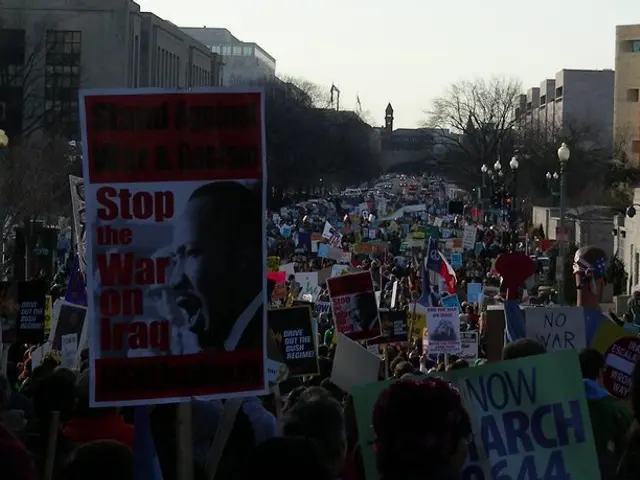Terrorist linked to Jaish admits planning Delhi and Mumbai attacks, contrary to Pakistan's denials regarding Masood Azhar's involvement
In a shocking revelation, a senior commander of the Jaish-e-Mohammed (JeM) terrorist outfit, Kashmiri, has testified to the involvement of Pakistan's military leadership in the funerals of slain JeM terrorists. The allegations, if proven true, could further strain relations between India and Pakistan.
According to reports, the directive to attend these funerals allegedly came from Army Chief Gen Asim Munir. High-ranking Pakistani military officials, including Lieutenant General Azhar Abbas and Major General Umar Farooq, are said to have attended the funeral ceremonies of terrorists killed by JeM in Bahawalpur on the orders of General Asim Munir.
The funerals in question are not new to controversy. In the past, India has accused Islamabad of giving state funerals to jihadists, viewing it as proof of Pakistan's military-intelligence nexus with terror outfits. The latest allegations, if substantiated, would strengthen this claim.
The JeM commander's statement directly corroborates India's long-held belief that JeM camps operated freely under Pakistan's watch. This assertion is further bolstered by Kashmiri's testimony, which invokes both Masood Azhar, a senior JeM leader, and Pakistan's army leadership.
Masood Azhar, who was based in Balakot, Pakistan, according to a top commander of the UN-designated outfit, has directly implicated himself in planning and executing terror attacks in Delhi and Mumbai. His presence in Balakot, identified as the staging ground for Azhar's campaign of violence against India, raises serious concerns.
The May 7 strike on JeM's Bahawalpur headquarters, Jamia Masjid Subhan Allah, caused devastating losses, including the deaths of Azhar's family members. The strike was in retaliation for the April 22 Pahalgam attack that killed 26 civilians.
Kashmiri's testimony leaves little room for Pakistan to deny the existence of terror sanctuaries. It also exposes Pakistan's duplicity, as they publicly align with the West on counterterrorism while sheltering and glorifying terrorists at home. This raises questions about Pakistan's commitment to combating terrorism and upholding international peace.
The strike that destroyed multiple terror launchpads in Pakistan and Pakistan Occupied Kashmir was part of Operation Sindoor. The operation, carried out by the Indian armed forces, was a clear message that India will not tolerate cross-border terrorism.
The links between JeM and Osama bin Laden's ideology, as suggested by Kashmiri's statement, add another layer of complexity to the already tense India-Pakistan relations. The international community must take note of these developments and press Pakistan to take decisive action against terror outfits operating within its borders.
Read also:
- United States tariffs pose a threat to India, necessitating the recruitment of adept negotiators or strategists, similar to those who had influenced Trump's decisions.
- Weekly happenings in the German Federal Parliament (Bundestag)
- Southwest region's most popular posts, accompanied by an inquiry:
- Discussion between Putin and Trump in Alaska could potentially overshadow Ukraine's concerns







